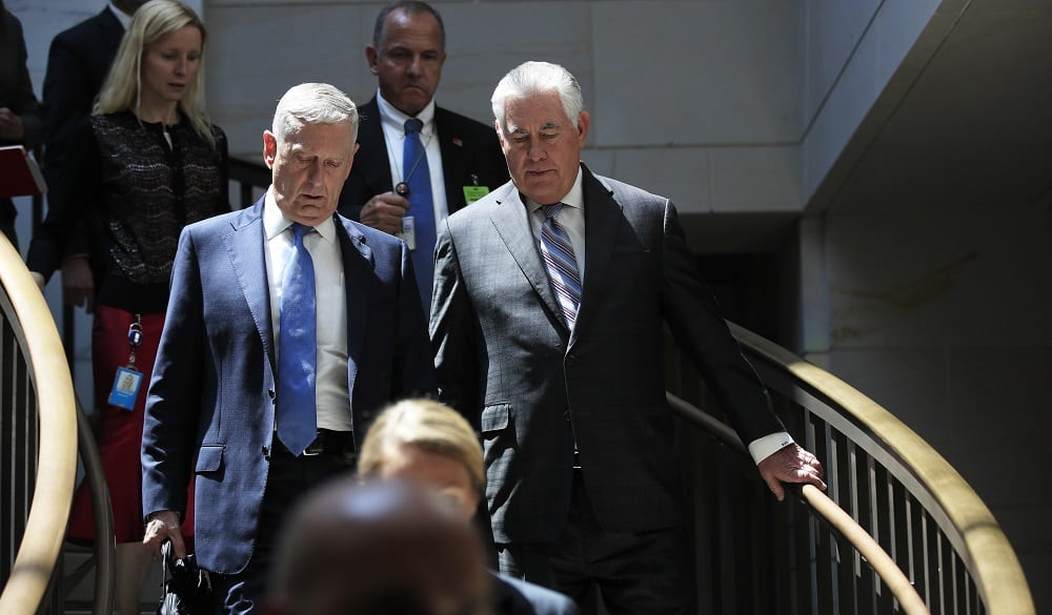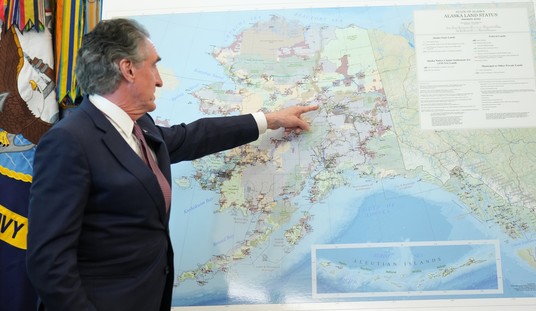The Wall Street Journal carries a joint op-ed by Secretary of Defense James Mattis and Secretary of State Rex Tillerson on the subject of North Korea headlined We’re Holding Pyongyang to Account.
The Obama administration developed a strategy called “strategic patience” for dealing with North Korea. This is the way it is described in The Diplomat:
In practice, “strategic patience” is a fancy way of saying that the United States will ignore North Korea and continue to levy unilateral and multilateral economic sanctions on Pyongyang as long as its leadership persists with nuclear development and ballistic missile testing. Indeed, strategic patience has come to embody a cycle of escalation and counter-escalation, where more nuclear weapons and ballistic missile tests from the North Koreans elicit stricter sanctions and inspections on Pyongyang’s economic activity, which in turn produces more belligerent behavior from the North Koreans.
This strategy is best described as “kick the can down the road.” It required the Obama administration to do nothing. It took few actions to sanction even egregious violators of sanctions. Most importantly it a) left China off the hook for any ownership of what was happening in North Korea and b) it misread the goals of the North Korean regime which does not want the better standard of living that giving up nukes and missiles can bring. They can’t be ignorant of the fact that as the Soviet regime liberalized its economy and improved the standard of living of its people, the regime became weaker and weaker.
This is what Mattis and Tillerson have to say:
In response, the Trump administration, with the support of the international community, is applying diplomatic and economic pressure on North Korea to achieve the complete, verifiable and irreversible denuclearization of the Korean Peninsula and a dismantling of the regime’s ballistic-missile programs. We are replacing the failed policy of “strategic patience,” which expedited the North Korean threat, with a new policy of strategic accountability.
The differences here are twofold (as far as I can tell). First, we are not seeking a freeze on development of nukes and missiles, we are after a dismantling of their ballistic missile and nuclear programs under the aegis of an international agency. Second, there seems to be an implied statement that the administration will not blink at sanctions violations.
The statement officially de-links US-ROK military cooperation from the nuclear issue. The Chinese and the North Koreans have sought to link any progress on nuclear weapons with a withdrawal of US forces from South Korea, with a cessation of major military deployments to Korea, and, lately, to the deployment of the US Terminal High-Altitude Area Defense to South Korea.
Installing Thaad launchers on the Korean Peninsula and conducting joint military exercises are defensive preparations against the acute threat of military actions directed against the U.S., our allies and other nations. China’s demand for the U.S. and South Korea not to deploy Thaad is unrealistic. Technically astute Chinese military officers understand the system poses no danger to their homeland.
The concept of negotiations with no pre-conditions seems to be off the table. The idea in talks with North Korea has been that the United States would enter into negotiations with North Korea on an “anywhere, anytime” basis. This created the perception of US weakness and North Korean strength by the juxtaposition of the US asking for talks while the North Korean regime acted and talked belligerently. The talks now are only available if North Korea meets pre-conditions.
The U.S. is willing to negotiate with Pyongyang. But given the long record of North Korea’s dishonesty in negotiations and repeated violations of international agreements, it is incumbent upon the regime to signal its desire to negotiate in good faith. A sincere indication would be the immediate cessation of its provocative threats, nuclear tests, missile launches and other weapons tests.
When you place this side-by-side with taking US military actions off the table, the North Koreans will be forced to come to the talks cap-in-hand.
An implied threat is aimed at Russian and Chinese companies that are serial violators of sanctions and who have been able to get away with it, over multiple administrations, for fear of offending powerful people in those nations:
The U.S. will continue to work with our allies and partners to deepen diplomatic and military cooperation, and to hold nations accountable to their commitments to isolate the regime. That will include rigorous enforcement of sanctions, leaving no North Korean source of revenue untouched. In particular, the U.S. will continue to request Chinese and Russian commitments not to provide the regime with economic lifelines and to persuade it to abandon its dangerous path.
From a standpoint of realism, this seems like a good move. It takes away all incentives for North Korea to create crises as a way of drawing concessions because it sets as a pre-condition the good behavior of North Korea. It makes the issue strictly about North Korea by removing any linkage between their behavior and our relationship with South Korea. And it makes North Korea a problem for both Russia and China, though of a lesser magnitude than a problem for us.
Time will tell how this plays out but the next douchenozzle that claims Trump’s North Korea policy is the same as Obama’s should be horsewhipped.













Join the conversation as a VIP Member